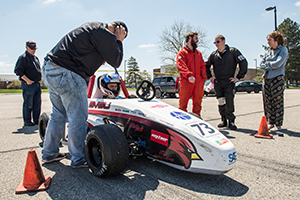May 18, 2016
SVSU Cardinal Formula Racing adapts and perseveres to again place among world’s best
 The Saginaw Valley State University Cardinal Formula Racing team competed well and finished highly during the 2016 Formula Society of Automotive Engineers (FSAE) Collegiate Design Series at Michigan International Speedway May 11-14.
The Saginaw Valley State University Cardinal Formula Racing team competed well and finished highly during the 2016 Formula Society of Automotive Engineers (FSAE) Collegiate Design Series at Michigan International Speedway May 11-14.
“I'm thrilled with my students,” said Brooks Byam, SVSU professor of mechanical engineering and the team's adviser. “They're a sophisticated race team that can build a car, get it ready and have it go fast right away. They're just awesome.”
Teams from higher education institutions across the globe attend the series, where student teams design and build an Indy-style race car over the course of the year. The competition features multiple competition categories such as endurance, acceleration, autocross, cost, presentation, and skid pad. The scores from each category determine an overall tally.
The competition is tougher than ever before, Byam said.
The evidence: While this year's SVSU team placed 30th out of 120 teams in the competition by scoring 568 points, last year's team placed higher – 26th – despite scoring nearly 50 points fewer.
“We're facing a lot more graduate schools from overseas, with students working at big, European professional sports car companies,” he said. “It's really tough.”
The top three teams in the 2016 competition arrived from Germany and Austria.
Year after year, SVSU has proven itself as one of the top university teams with exclusively undergraduate students. For the second consecutive year in 2016, SVSU placed highest among schools without a graduate program in engineering.
To put 30th place in perspective, SVSU’s students outperformed teams from schools such as University of Michigan-Ann Arbor (who finished No. 46 overall), as well as Duke (No. 37), Northwestern (No. 53) and Georgia Tech (No. 54).
(A full list is published at http://www.sae.org/images/cds/selfservice/463280566_FSAE_MI_2016_overall_prelim.pdf)
Byam said the FSAE contest - and the year of preparation that precedes it - offers valuable learning experiences for SVSU students eyeing a career in engineering.
“The competition is results-oriented, there's a tight time line, a tight budget, and you have to perform at your absolute peak in a globally-competitive environment,” he said. “If you have to hire someone to be an engineer, you want to be able to check those boxes. Students who can check those boxes will make an impact on the industry.”
Ryan Whitman, the team's captain and a mechanical engineering major from Standish, said working with Cardinal Formula Racing opened doors for him professionally.
“It's prepared me for everything I want to do with my career after college,” he said. “I want to work in racing or performance vehicles, and this has been a great experience for me.”
Whitman recently began a spring- and summer-long internship at Auburn Hills-based Chrysler's SRT (street and racing technology) division.
“The only reason I got this opportunity is through Cardinal Formula Racing,” Whitman said. “Chrysler looked at my résumé, saw I had the experience and brought me here.”
The team has formed partnerships with several companies in the industry over the years, and those networks often help students land jobs after graduation. For instance, Buena Vista-based Nexteer Automotive, which donated tires as well as trucks and trailers to transport the students' car and equipment this year, employs several Cardinal Formula Racing alumni.
“Nexteer has been a huge supporter of our program because they know what kind of students come from this program,” Byam said.
The FSAE competition helps students keep score of their skills in ways that aren't measured in final points tallies.
For instance, this year's team's toughest challenge at the Michigan International Speedway happened when a judge's interpretation of a competition rule forced the students to perform some on-the-spot welding during the technical inspection portion of the competition, Byam said.
When a judge ruled that the SVSU car's fuel tank was too exposed to the ground, the team added a steel frame beneath the tank. The work partly damaged the vehicle's electrical system. The students discovered the damage later during a timed portion of the competition.
“They fixed the problem but our time was running out. They had less time to go through their normal processes and procedures, so they overlooked some things that cost us,” Byam said. “We probably could have gotten another 30 points out of the car if that hadn't happened.”
Another 30 points would have landed the team in 20th place.
While the lost points irked the competitive side of Byam, he said being forced to adapt the vehicle on the fly provided valuable training for the students.
“All these things the judges can throw at them – where the students have to react and innovate – helps them in the long run,” Byam said. “It's about learning. That's what we do.”
For more on SVSU’s Cardinal Formula Racing Program, visit svsu.edu/cardinalformularacing/.
